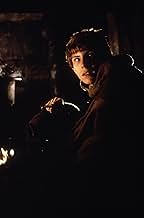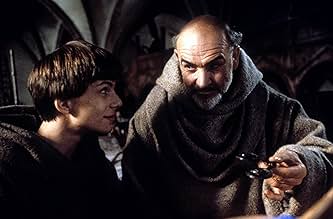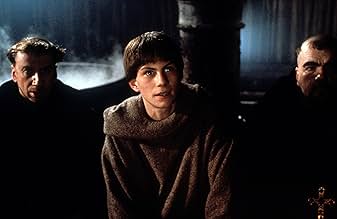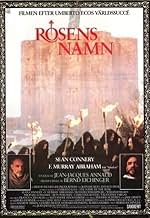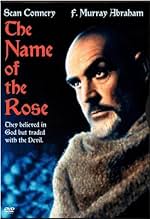An intellectually nonconformist friar investigates a series of mysterious deaths in an isolated abbey.An intellectually nonconformist friar investigates a series of mysterious deaths in an isolated abbey.An intellectually nonconformist friar investigates a series of mysterious deaths in an isolated abbey.
- Won 2 BAFTA Awards
- 17 wins & 6 nominations total
Donald O'Brien
- Pietro d'Assisi
- (as Donal O'Brian)
Storyline
Did you know
- TriviaSean Connery's career was at such a low point when he read for the role that Columbia Pictures refused to finance the movie when Jean-Jacques Annaud cast him as William von Baskerville.
- GoofsThe secret message on the parchment is exposed three times. The translator heated it to reveal the location of the library, William of Baskerville heated it again when he was in the scriptorium and yet again to show the others the message. When a message is written in lemon juice, heating it will cause it to become exposed because the sugar in the juice is caramelized and thus would not disappear again.
- Quotes
William of Baskerville: But what is so alarming about laughter?
Jorge de Burgos: Laughter kills fear, and without fear there can be no faith, because without fear of the Devil there is no more need of God.
- Crazy creditsThe opening credits read - A palimpsest of Umberto Eco's Novel The Name of the Rose
- Alternate versionsCertain prints of the movie have the sex scene between Adso and The Girl removed in order to comply with local laws.
Featured review
Umberto Eco's novel has something of a reputation as one of the great unread bestsellers. To have it on the shelf in the early eighties was a fashion statement as much as it was a literary necessity. And yet when the film was released, it was attacked for being an ineffective adaptation. Turning the 600-page novel, a detective mystery enriched by descriptions of medieval life and semiotic ruminations characteristic of Eco's academic writings, into a mainstream two-hour movie was, of course, ambitious. Four credited screenwriters and an international co-production gave off a sense of struggle and indecision. The movie was, and remains, easy to deride.
It's true that the film, directed by Jean-Jacques Annaud, has to skip, or skirt, much of Eco's detail - the famous pages-long description of the doorway, for example, is acknowledged by a few camera shots - but it takes the novel's literary strengths and offers a cinematic equivalent: a vivid depiction of monastic life which thrusts the viewer into the period of the story. In this respect, the production is exemplary: cinematographer Tonino Delli Colli, art director Dante Ferretti and composer James Horner were all operating at the top of their game.
And, as Renton in Trainspotting (1996) knows, Sean Connery proved a perfect choice as William of Baskerville, the 14th-century Sherlock Holmes figure investigating the deaths in an Italian monastery. It's one of Connery's best performances, a happy marriage of character acting and star casting: he suits the physical description of William and he properly conveys the character's wisdom, caution and sense of regret. Christian Slater's Adso, the narrator of the novel, is a surrogate for the viewer, expressing bafflement at the mystery story and awe at William's deductive powers; while F. Murray Abraham works wonders with the underwritten part of the inquisitor Bernardo Gui.
The Name of the Rose is one of the most underrated movies of the eighties. That it wasn't brilliant should not detract from the fact that it's as good as it is.
It's true that the film, directed by Jean-Jacques Annaud, has to skip, or skirt, much of Eco's detail - the famous pages-long description of the doorway, for example, is acknowledged by a few camera shots - but it takes the novel's literary strengths and offers a cinematic equivalent: a vivid depiction of monastic life which thrusts the viewer into the period of the story. In this respect, the production is exemplary: cinematographer Tonino Delli Colli, art director Dante Ferretti and composer James Horner were all operating at the top of their game.
And, as Renton in Trainspotting (1996) knows, Sean Connery proved a perfect choice as William of Baskerville, the 14th-century Sherlock Holmes figure investigating the deaths in an Italian monastery. It's one of Connery's best performances, a happy marriage of character acting and star casting: he suits the physical description of William and he properly conveys the character's wisdom, caution and sense of regret. Christian Slater's Adso, the narrator of the novel, is a surrogate for the viewer, expressing bafflement at the mystery story and awe at William's deductive powers; while F. Murray Abraham works wonders with the underwritten part of the inquisitor Bernardo Gui.
The Name of the Rose is one of the most underrated movies of the eighties. That it wasn't brilliant should not detract from the fact that it's as good as it is.
- edwardlamberti
- Sep 15, 2004
- Permalink
Details
- Release date
- Countries of origin
- Languages
- Also known as
- Ime rože
- Filming locations
- Kloster Eberbach, Eltville Am Rhein, Hessen, Germany(interiors: monastery church)
- Production companies
- See more company credits at IMDbPro
Box office
- Budget
- ITL 30,000,000,000 (estimated)
- Gross US & Canada
- $7,153,487
- Opening weekend US & Canada
- $494,571
- Sep 28, 1986
- Gross worldwide
- $7,153,487
- Runtime2 hours 10 minutes
- Color
- Aspect ratio
- 1.85 : 1
Contribute to this page
Suggest an edit or add missing content


